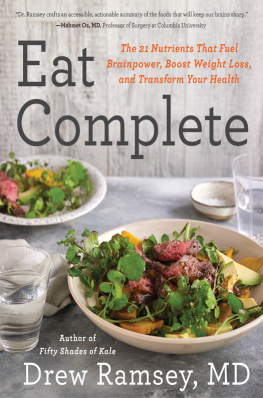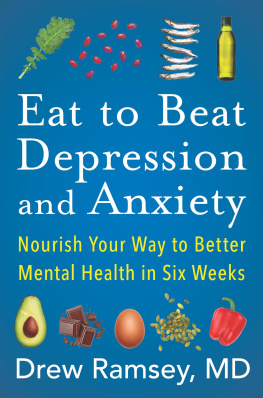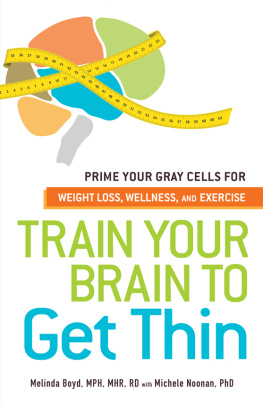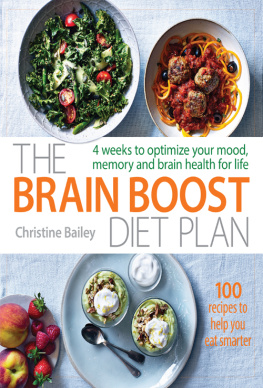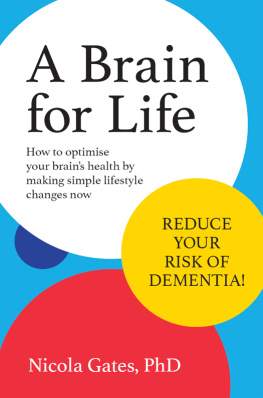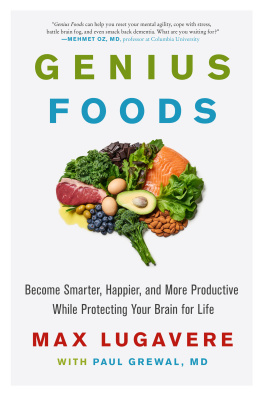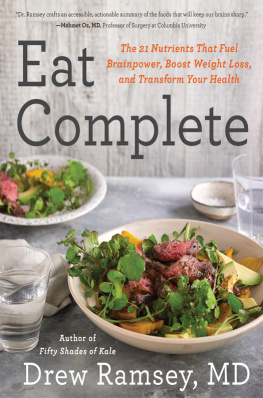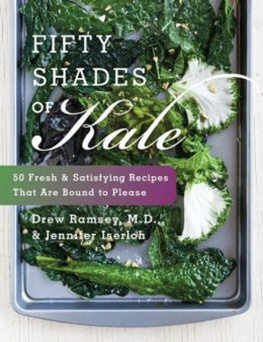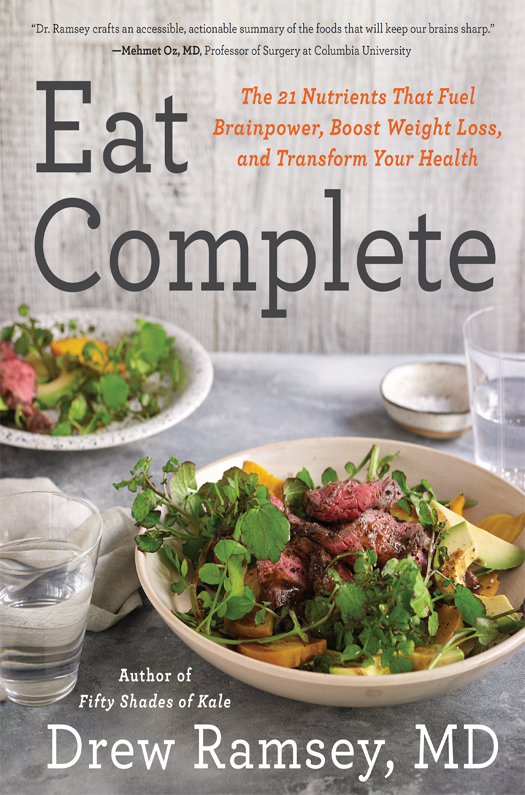To Lucy, Greta, and Forrest.
No meal is complete without you.

Contents
Guide

O ur health is being challenged like never before in history. Youve seen the headlines: modern food and lifestyle have made us sick, a nation overfed and yet undernourished. Add to this the new stressors of ceaseless media, more work, and less sleep. The need for proper nourishment and self-care is pressing and unprecedented.
Thankfully, the foundation of good health is delicious. For the first time in centuries, doctors are prescribing food. As our focus on health, nutrition, and wellness has grown, so too has the role of food in medicine. My work as a psychiatrist is all about brain health, which means helping people care for and protect their biggest asset: the brain. And it turns out that brain health is directly influenced by the food we eat.
Nutritional psychiatry is the new forefront of the psychiatric field, a movement focused on the mental health impact of food. As the movement has grown, so too has my desire to bring the important lessons about the impact of food on the brain to a wider audience. The advice in these pages is a prescription for your brain health and wellness, intended to help you cut through the controversies and eat with confidence. And the best prescription is to feed your brain properly, as an undernourished brain has profound implications for all aspects of life.
I learned about food growing up on my familys farm in southern Indiana, and I learned about brain health at Columbia University College of Physicians and Surgeons, the top department of psychiatry in the United States, where I trained and have taught for the last twelve years. I now teach brain nutrition to graduate students and psychiatry residents, and Im also in active clinical practice doing my best to apply my training to the art of medicine. While I primarily treat patients with mood and anxiety disorders, this book is for the general public. Everyone with a brain should know how to feed it.
A few years back, I changed how I practice medicine. A new class of medications was causing a series of side effects for the patients in our clinic. While these medications were often necessary, patients began to gain weight at an alarming rate, and frequently developed diabetes and high blood pressure. As a physician bound to the maxim Do no harm, I am obligated to help mediate these side effects. Healthy eating and exercise were major interests in my personal life, and Id been a vegetarian for about a decade, but I hadnt been talking to my patients about food and lifestyle choices.
It started to gnaw at me. Not only were the medications I was prescribing adding to my patients health problems, but I realized I was totally untrained to counsel them about nutrition. Doctors dont learn about nutrition in medical school, even though poor food choices are at the root of the majority of health concerns in our country. I remember sitting with a woman who was free of the symptoms of her mental illness for the first time in years, realizing that she had also gained thirty pounds. I knew then that food needed to be a fundamental part of our assessment and prescription as doctors.
Food became a focus of my work. Increasingly curious about what my patients ate, I was also determined to find out what I should advise them to eat based on scientific evidence. I started talking to patients about their food, and reading about the recent advances in the science of nutrition. I learned that my patients were just as confused as I was. I felt foolish as I realized that the standard advice I was offeringDont eat cholesterol or fatwas both scientifically wrong and woefully inadequate. I also learned that my vegetarian diet wasnt likely the healthiest. It was time to figure out what constituted a healthy meal.
As my understanding of healthy foods captivated my work as a physician, it also took a prominent role in my personal life thanks to a new motivation: my wife was pregnant with our daughter. Every molecule in our daughters developing brain would come from the food choices we made over the next few years. I needed to establish a core set of foods that would best nourish our new family.
As a physician interested in brain health, Ive been struck by how little we consider the impact of food. We think of our bodies, but we put minimal thought and focus into how food choices relate to our brains, or how the state of our brains can affect so many important aspects of our overall health and mood. Our brains are both our greatest asset and the home of the hungriest cells in our body. Its crucial to feed these cells welland thats important across the board, whether or not you are a patient on my couch. Not matter your personal background, genetics, or situation, the core of your personal wellness is your food.
As the science continues to advance, its become easier to see the impact food has on our brain health. Our brains consume 20 percent of everything we eat; this nourishment provides the energy and nutrients to create and sustain the quadrillions of connections that construct the brain, and the electricity that courses between those connections. Your brain is the organ of connection, and you depend on these connections for all aspects of your life: Your work. Your relationships. Your memories. Your intentions. Your dreams. You have in your possession the most complex structure in the known universe, a human brainbut most of us, myself included, were never taught how to optimally fuel it.
In my practice, I was prescribing medications and doing talk therapy, but it seemed clear that food presented a unique opportunity to further help my patients. It would certainly be my most delicious prescription. Better food choices would ensure that my patients brains were optimally nourished with building block nutrients such as omega-3 fats, vitamin B12, and zinc. It would also make their brains more resilient by enhancing brain growththe latest brain science tells us that human brains continue to grow through adulthood, creating new brain cells and also new connections. On top of that, eating better food would decrease my patients risk of obesity, diabetes, and heart disease, all diseases that wreak havoc on mental health.
Armed with this knowledge, I made food as medicine the primary focus of my clinical work. My colleagues and I started to serve the patients in our clinic more plants and other nutrient-rich foods for lunch. Many started to lose weight and reported an improvement in their mood and self-confidence. This became a key tool in their treatment. And in addition to better nourishment, they also engaged in the mindful art of self-care.
My goal today is to help people achieve proper nourishment with every biteand its become clear from the results that food can be an excellent medicine. Recently, a patient with panic attacks was largely cured by eating more seafood and having eggs for breakfast. A woman in her thirties noticed a significant reduction in her severe anxiety and mood swings after introducing more seafood and lentils into her food plan. A teenager who was irritable and argumentative with his parents became more reasonable with them after starting his day with a fruit, yogurt, and nut smoothie.

